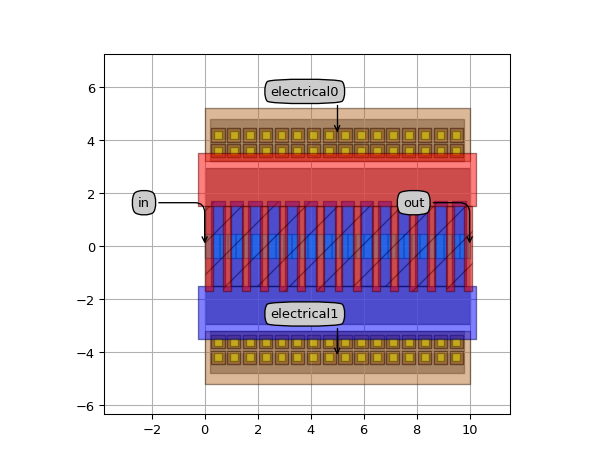LongitudinalPNPhaseShifterTemplate
- class picazzo3.modulators.phase.trace.LongitudinalPNPhaseShifterTemplate
PN or PIN junction phase shifter with a longitudinal (interdigited) junction.
- Parameters:
- n_contact: PCell
- p_contact: PCell
- trace_template: PCell and _TraceTemplate
Refers to the other trace template from which information is taken to build this trace template.
- name: String that contains only ISO/IEC 8859-1 (extended ASCII py3) or pure ASCII (py2) characters
The unique name of the pcell
Views
- class Layout
- Parameters:
- n_length: float and int, float, integer, floating and number >= 0
length of the N+ area, in longitudinal direction (finger width)
- p_length: float and int, float, integer, floating and number >= 0
length of the P+ area, in longitudinal direction (finger width)
- n_metal1_width: float
width of metal1 in the lateral direction, N side
- n_metal1_offset: float
offset of metal1 in the lateral direction, N side
- p_metal1_width: float
width of metal1 in the lateral direction, P side
- p_metal1_offset: float
offset of metal1 in the lateral direction, P side
- n_contact_offsets: list<number > 0>
offsets of the contact plugs in the lateral direction, N side
- n_contact_pitch: float and number > 0
pitch of the contact plugs, longitudinal direction, N side
- p_contact_offsets: list<number > 0>
offsets of the contact plugs in the lateral direction, P side
- p_contact_pitch: float and number > 0
pitch of the contact plugs, longitudinal direction, P side
- n_silicide_extension: float
extension of the silicide area from the trace in longitudinal direction, N side
- n_silicide_width: float
width of the silicide area, in lateral direction, N side
- n_silicide_offset: float
offset of the silicide area from the centerline in lateral direction, N side
- p_silicide_extension: float
extension of the silicide area from the trace in longitudinal direction, P side
- p_silicide_width: float
width of the silicide area, in lateral direction, P side
- p_silicide_offset: float
offset of the silicide area from the centerline in lateral direction, P side
- nplus_extension: float
extension of the P++ area from the trace in longitudinal direction
- nplus_width: float
width of the N++ area, in lateral direction
- nplus_offset: float
offset of the N++ area from the centerline in lateral direction
- n_width: float and int, float, integer, floating and number >= 0
width of the N+ area, in lateral direction
- pplus_extension: float
extension of the P++ area from the trace in longitudinal direction
- pplus_width: float
width of the P++ area, in lateral direction
- pplus_offset: float
offset of the P++ area from the centerline in lateral direction
- p_width: float and int, float, integer, floating and number >= 0
width of the P+ area, in lateral direction
- nplus_purpose: PatternPurpose
N++ drawing purpose
- n_purpose: PatternPurpose
N+ drawing purpose
- pplus_purpose: PatternPurpose
P++ drawing purpose
- p_purpose: PatternPurpose
P+ drawing purpose
- metal1_purpose: PatternPurpose
metal1 drawing purpose
- silicide_purpose: PatternPurpose
silicide drawing purpose
- nplus_process: ProcessLayer
N++ implant process, in the contacted area
- n_process: ProcessLayer
N+ implant process (junction)
- pplus_process: ProcessLayer
P++ implant process, in the contacted area
- p_process: ProcessLayer
P+ implant process (junction)
- metal1_process: ProcessLayer
metal1 process
- silicide_process: ProcessLayer
silicide process, in th contacted area
- flipped:
flips P and N side
- junction_overlap: float
overlap of P and N regions. Set to a negative value to obtain a PIN junction
- metal_windows: List with type restriction, allowed types: <class ‘ipkiss3.pcell.trace.window.window._TraceWindow’>
List of Trace Windows for the metallization layers
- contact_windows: List with type restriction, allowed types: <class ‘ipkiss3.pcell.trace.window.window._TraceWindow’>
List of Trace Windows for the contacts
- implant_windows: List with type restriction, allowed types: <class ‘ipkiss3.pcell.trace.window.window._TraceWindow’>
List of Trace Windows for the implant layers
- windows_for_ports: List with type restriction, allowed types: <class ‘ipkiss3.pcell.trace.window.window._TraceWindow’>
List of Trace Windows from which ports will be generated
- core_width: float and number > 0
width of the waveguide core
- core_layer: __Layer__
layer used to define the core of the waveguide
- flatten_contents:
if True, it will insert the referred trace as elements in the layout, rather than as an Instance
- pin_shape: Shape
shape to be used for the pins
- trace_template_for_ports: _TraceTemplate.Layout
Trace template to be used for the ports. Default = this template
- windows: List with type restriction, allowed types: <class ‘ipkiss3.pcell.trace.window.window._TraceWindow’>
List of Trace Windows to draw on top of the already defined TraceTemplate
- keep_original_trace_template:
- width: float and int, float, integer, floating and number >= 0
- control_shape_layer: __Layer__
layer on which the control shape is drawn
- draw_control_shape:
draws the control shape on top of the waveguide
- cover_layers: List with type restriction, allowed types: <class ‘ipkiss.primitives.layer.Layer’>
layers that can be used to generate additional coverage of the trace (e.g. manhattan corners)
- view_name: String that contains only alphanumeric characters from the ASCII set or contains _$. ASCII set is extended on PY3.
The name of the view
Examples
import si_fab.all as pdk # noqa: F401 import ipkiss3.all as i3 from picazzo3.modulators.phase import LongitudinalPNPhaseShifterTemplate from picazzo3.traces.rib_wg import RibWaveguideTemplate from picazzo3.electrical.contact import ContactHole wire_t = RibWaveguideTemplate() wire_t.Layout(core_width=0.9, cladding_width=2 * i3.TECH.WG.TRENCH_WIDTH + 0.9) c = ContactHole(name="LPINPS_CONT") ps_t = LongitudinalPNPhaseShifterTemplate(trace_template=wire_t, p_contact=c, n_contact=c) ps_t.Layout(p_length=0.3, n_length=0.5, junction_overlap=0.05) ps = ps_t(name="ExampleLongitundinalPNPhaseShifterTemplate") ps_lay = ps.Layout(shape=[(0.0, 0.0), (10.0, 0.0)]) ps_lay.visualize(annotate=True)
